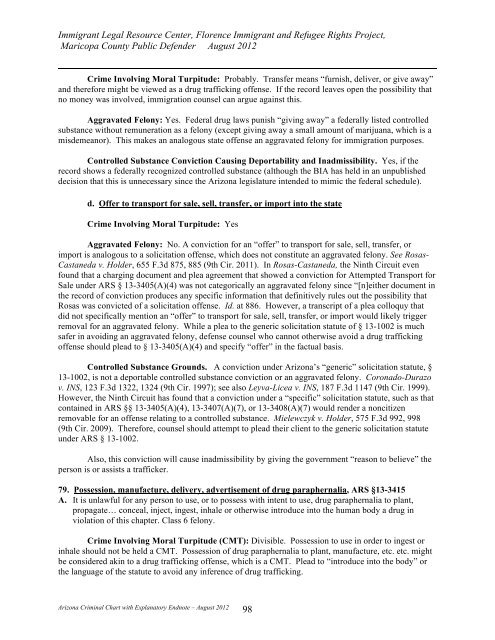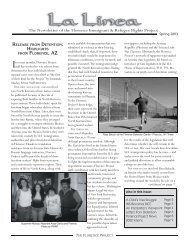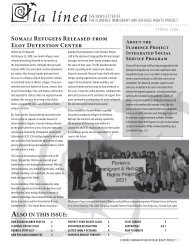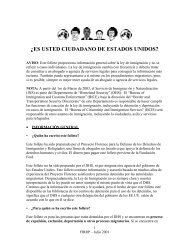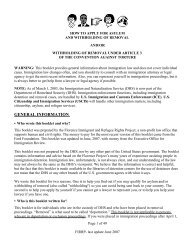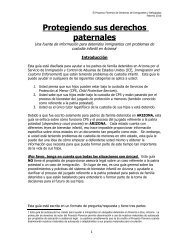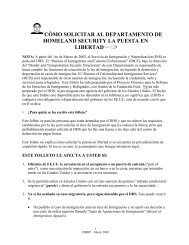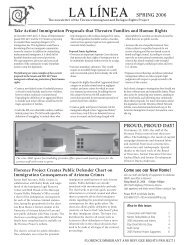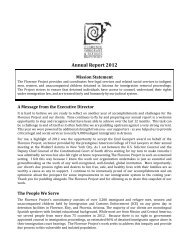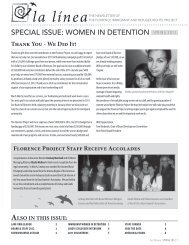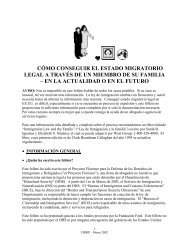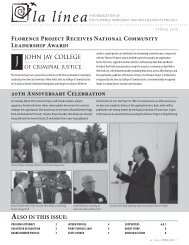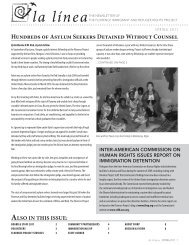quick reference chart and annotations for determining immigration ...
quick reference chart and annotations for determining immigration ...
quick reference chart and annotations for determining immigration ...
Create successful ePaper yourself
Turn your PDF publications into a flip-book with our unique Google optimized e-Paper software.
Immigrant Legal Resource Center, Florence Immigrant <strong>and</strong> Refugee Rights Project,<br />
Maricopa County Public Defender August 2012<br />
Crime Involving Moral Turpitude: Probably. Transfer means “furnish, deliver, or give away”<br />
<strong>and</strong> there<strong>for</strong>e might be viewed as a drug trafficking offense. If the record leaves open the possibility that<br />
no money was involved, <strong>immigration</strong> counsel can argue against this.<br />
Aggravated Felony: Yes. Federal drug laws punish “giving away” a federally listed controlled<br />
substance without remuneration as a felony (except giving away a small amount of marijuana, which is a<br />
misdemeanor). This makes an analogous state offense an aggravated felony <strong>for</strong> <strong>immigration</strong> purposes.<br />
Controlled Substance Conviction Causing Deportability <strong>and</strong> Inadmissibility. Yes, if the<br />
record shows a federally recognized controlled substance (although the BIA has held in an unpublished<br />
decision that this is unnecessary since the Arizona legislature intended to mimic the federal schedule).<br />
d. Offer to transport <strong>for</strong> sale, sell, transfer, or import into the state<br />
Crime Involving Moral Turpitude: Yes<br />
Aggravated Felony: No. A conviction <strong>for</strong> an “offer” to transport <strong>for</strong> sale, sell, transfer, or<br />
import is analogous to a solicitation offense, which does not constitute an aggravated felony. See Rosas-<br />
Castaneda v. Holder, 655 F.3d 875, 885 (9th Cir. 2011). In Rosas-Castaneda, the Ninth Circuit even<br />
found that a charging document <strong>and</strong> plea agreement that showed a conviction <strong>for</strong> Attempted Transport <strong>for</strong><br />
Sale under ARS § 13-3405(A)(4) was not categorically an aggravated felony since “[n]either document in<br />
the record of conviction produces any specific in<strong>for</strong>mation that definitively rules out the possibility that<br />
Rosas was convicted of a solicitation offense. Id. at 886. However, a transcript of a plea colloquy that<br />
did not specifically mention an “offer” to transport <strong>for</strong> sale, sell, transfer, or import would likely trigger<br />
removal <strong>for</strong> an aggravated felony. While a plea to the generic solicitation statute of § 13-1002 is much<br />
safer in avoiding an aggravated felony, defense counsel who cannot otherwise avoid a drug trafficking<br />
offense should plead to § 13-3405(A)(4) <strong>and</strong> specify “offer” in the factual basis.<br />
Controlled Substance Grounds. A conviction under Arizona’s “generic” solicitation statute, §<br />
13-1002, is not a deportable controlled substance conviction or an aggravated felony. Coronado-Durazo<br />
v. INS, 123 F.3d 1322, 1324 (9th Cir. 1997); see also Leyva-Licea v. INS, 187 F.3d 1147 (9th Cir. 1999).<br />
However, the Ninth Circuit has found that a conviction under a “specific” solicitation statute, such as that<br />
contained in ARS §§ 13-3405(A)(4), 13-3407(A)(7), or 13-3408(A)(7) would render a noncitizen<br />
removable <strong>for</strong> an offense relating to a controlled substance. Mielewczyk v. Holder, 575 F.3d 992, 998<br />
(9th Cir. 2009). There<strong>for</strong>e, counsel should attempt to plead their client to the generic solicitation statute<br />
under ARS § 13-1002.<br />
Also, this conviction will cause inadmissibility by giving the government “reason to believe” the<br />
person is or assists a trafficker.<br />
79. Possession, manufacture, delivery, advertisement of drug paraphernalia, ARS §13-3415<br />
A. It is unlawful <strong>for</strong> any person to use, or to possess with intent to use, drug paraphernalia to plant,<br />
propagate… conceal, inject, ingest, inhale or otherwise introduce into the human body a drug in<br />
violation of this chapter. Class 6 felony.<br />
Crime Involving Moral Turpitude (CMT): Divisible. Possession to use in order to ingest or<br />
inhale should not be held a CMT. Possession of drug paraphernalia to plant, manufacture, etc. etc. might<br />
be considered akin to a drug trafficking offense, which is a CMT. Plead to “introduce into the body” or<br />
the language of the statute to avoid any inference of drug trafficking.<br />
Arizona Criminal Chart with Explanatory Endnote – August 2012<br />
98


